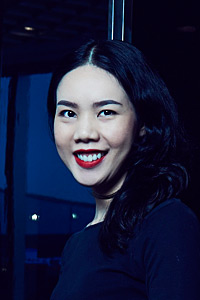In a time of self-censorship, when the free mind is blocked, people are restricting their own expression, out of fear. With scepticism, I question how loudly one is allowed to think in such an Orwellian society. When a major political protest took place in March 2009, a Facebook friend asked me openly on my wall if I was a "red shirt" or a "yellow shirt" supporter. I did not answer. Yes, self-censorship. This might have been the very beginning where I -- as an individual -- started to keep my mouth shut. Instead of expressing my opinions, I choose to bottle up my thoughts and keep mum when it comes to politics.
During these years of Thai political turmoil, this big split appears to be a big issue.
Friends easily become enemies merely because of their political viewpoints. People protest on the streets as well as on social media.
The virtual platforms have turned into dangerous spots where people have disputes over criticisms of each other and respond in self-defence or burst with ugly anger.
Socially, for some personal reasons, I decided to control what I say, post or discuss when it comes to politically sensitive subjects. To avoid annoying or offending others or causing conflicts, not to think aloud has become a new practice.
That very choice I made earlier was something that became compulsory once the junta seized power in 2014.
By security orders, all discussions are closed. Political gatherings are banned. Websites are blocked. Media is censored. Scholars, journalists, activists and scholars have been detained. Politicians have been raided.
Anything you post on the internet doesn't guarantee your well-being.
Politically, now we are all unable to speak. Free thought and free speech have been silenced.
With repressive measures, the military rulers may have been successful in leading a country where its citizens are living in fear and are deterred from thinking critically.
But, in fact, no one can really stop us from exercising our own mind. It is only that such radical thoughts are just simply not (allowed to be) uttered. In this authoritarian setting, it's necessary to carefully consider what to say and what not to say, as I become more cautious in voicing my opinions in a personal manner. (The ruling junta also blocks media freedom -- but, phew, I only write about beauty, lifestyle and fashion: what the season's new must-haves are, how to contour and what the hottest new exercise trends are.) In day-to-day conversations, I've found that having "zero comment" can be a magic trick to survive in this country, socially and politically.
Although "I have no idea", "I have no clue" and "Not as far as I know" may make you sound dumb and stupid, these common phrases can come in handy to put a stop to an uncomfortable conversation when you are a member of a drama-driven society like Thailand and are not sure of being able to keep conversations civil, both on and offline.
Silence is golden.
In virtue of self-censorship, during these years of political turbulence, I've learned that after all, before politics, your relationships with people and a peaceful state of mind are what really matter.
Though I choose to close my mouth and "know nothing" for now, I silently remain positive and I'm, still, counting down to the days when free speech is given back to the people. In democratic faith and a dream for free expression, I look forward to finally seeing the light at the end of the tunnel in 2017 when the whole country can speak aloud liberally again (Prime Minister Prayut promises electoral democracy to happen some time next year).
When democracy, justice, liberty, equality and human dignity are restored.
That time when the people of Thailand can think and speak their opinions again, loud and clear. We all can then again enjoy the fundamental human right of freedom of expression.
Yet, in the meantime, as a decent Thai citizen: I don't think, therefore I am.
Pimchanok Phungbun Na Ayudhya is the editor of Muse.
